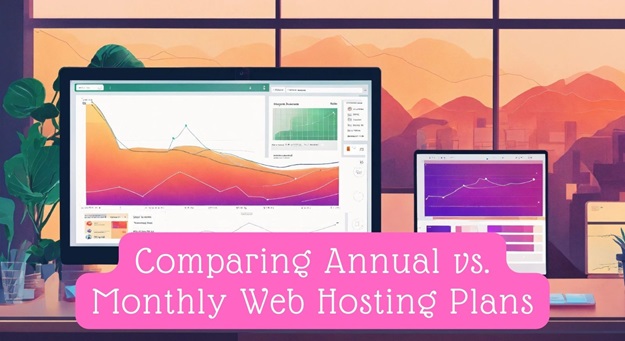Web hosting is a crucial part of your online business strategy, with the choice of hosting plan significantly influencing your website’s performance, security, and overall success. A common dilemma faced by businesses is whether to opt for annual or monthly hosting plans. The aim of this article is to provide an in-depth analysis of these two payment options, their pros and cons, and guidance on making an informed choice.
Web Hosting: A Quick Overview
Web hosting is a service that provides the necessary technology and infrastructure for a webpage or website to be viewed on the Internet. It involves storing your website files on a server, from where they can be accessed by users through the World Wide Web.
Exploring the Future Trends of Web Hosting Industry
There are various types of web hosting services, including shared hosting, VPS hosting, dedicated hosting, and cloud hosting.
Understanding the Payment Options: Annual vs Monthly
Annual Web Hosting
Annual web hosting plans require you to pay for a year’s worth of service upfront. This payment model is akin to leasing a workspace for a year, where you pay the total rent at the beginning of the lease period.
Pros
- Cost-effective: Paying annually typically offers a cost advantage as hosting providers often provide significant discounts for long-term commitments. This can result in substantial savings over the year.
- Simplified billing: With annual payments, you bypass the need for monthly payments, simplifying your administrative tasks and ensuring uninterrupted service.
- Ideal for long-term projects: If you have a long-term online presence plan, annual payments allow you to focus on your website without frequent billing concerns.
Cons
- Higher upfront cost: As you’re paying for an entire year in advance, the initial outlay can be high, which might not suit businesses with tight budgets.
- Reduced flexibility: With annual payments, you’re committed to the hosting provider for a longer period. Switching providers if you’re unhappy with the service can be more challenging.
Monthly Web Hosting
In contrast, monthly web hosting plans involve a recurring payment every month for the hosting services. This payment model can be likened to a monthly gym membership, where you have the option to discontinue the service at any time.
Pros
- Flexibility: Monthly payments offer more adaptability. If you’re unsure about the hosting provider or need a short-term solution, monthly payments allow you to change providers quickly.
- Lower initial cost: Monthly plans usually require a lower initial investment, making it easier to get started, especially for businesses with limited budgets.
- No long-term commitment: Monthly payments mean you’re not locked into a long-term contract, which is beneficial if you anticipate changes in your hosting needs.
Cons
- Higher total cost: In the long run, monthly payments can result in a higher overall cost as hosting providers often offer discounts for longer commitments.
- Risk of service disruption: Monthly billing cycles require regular payments. Missed payments can lead to service suspension or website downtime.
Key Considerations When Comparing Annual and Monthly Web Hosting Plans
When comparing annual and monthly web hosting plans, several factors come into play. These include:
1. Business Size and Needs
The size and specific needs of your business are critical in determining the appropriate payment plan. For small businesses or startups with uncertain future needs, monthly plans offer more flexibility. Conversely, for larger businesses with stable long-term plans, annual plans may be more cost-effective.
2. Cost
Both upfront and long-term costs need to be considered. While monthly plans may have a lower initial cost, the overall cost over a year can be higher than that of an annual plan.
3. Technical Expertise
Some hosting plans require more technical knowledge than others. While shared hosting is relatively straightforward and requires little technical expertise, VPS or dedicated hosting may necessitate a higher level of technical understanding.
4. Customer Service
The level of customer service provided by the hosting company is another essential factor. Reliable and prompt customer support can be invaluable, particularly in case of technical issues or service disruptions.
5. Flexibility and Customizability
The degree of control and customization you require over your hosting environment will also influence your choice of plan. While shared hosting offers little room for customization, VPS or dedicated hosting allows a higher level of control.
6. Reliability and Security
Reliability and security are crucial, particularly for businesses that primarily operate online. The risk of service disruption or data breaches can significantly impact your business.
7. Scalability
If you anticipate your business to grow or your website traffic to increase significantly, you will need a plan that is scalable.
Choosing the Right Web Hosting Plan
Determining whether to opt for a monthly or annual web hosting plan ultimately depends on your specific business needs, budget, and long-term plans. Both options have their advantages and downsides.
Explaining the Difference Between Managed and Unmanaged Hosting
While monthly payments offer flexibility and a lower initial cost, they can result in higher long-term costs and the potential risk of service disruption. On the other hand, annual payments can be more cost-effective and convenient for long-term projects, but they come with a higher upfront cost and less flexibility.
In conclusion, the choice between monthly and annual web hosting plans depends on your specific circumstances. Carefully consider your financial situation, hosting needs, and future plans when making this decision. No matter which payment plan you choose, remember to choose a reputable web hosting provider that fits your business requirements and offers excellent customer service.

